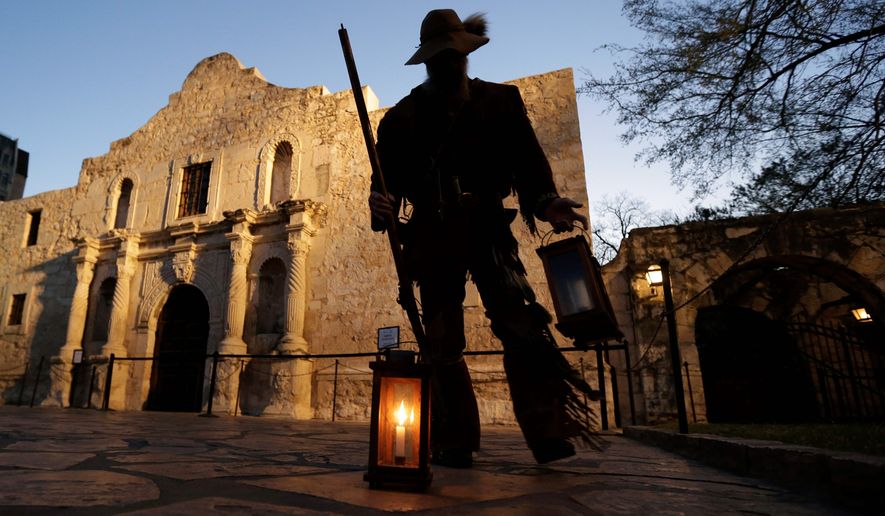The Texas State Board of Education appears to have decided the heroism of the Alamo is worth teaching to students after all.
State politicians erupted in protest this month after a volunteer team of educators, looking for ways to “streamline” the state’s social studies curriculum, recommended scrubbing references to “all the heroic defenders” at the Alamo from classroom teaching plans.
Gov. Greg Abbott and Lt. Gov. Dan Patrick, both Republicans, accused the panel of allowing the dictates of political correctness to run wild and demanded that Texans call the board to complain.
Rep. Ted Poe showed up personally before the board on Tuesday to demand respect for history. He quoted from William B. Travis’ letter to “the people of Texas and all the Americans in the world” seeking reinforcements for about 200 men holed up at the Alamo Mission in 1836, making a doomed stand against a Mexican army about 10 times that size led by Gen. Antonio Lopez de Santa Anna.
The board, having been sufficiently chastened, voted Wednesday to maintain references to heroism — but with an additional nod to diversity.
Under the latest plan, seventh-graders asked to “explain the issues surrounding significant events of the Texas Revolution” will now be expected to know “the heroism of the diverse defenders who gave their lives” at the Alamo.
The vote, which must be confirmed in final adoption of the curriculum this year, was unanimous.
Chairwoman Donna Bahorich, wanting to make sure everyone was accounted for, said a voice vote wasn’t enough.
“We’ve taken so much heat I want a recorded vote on this,” she declared.
The panel of educators who proposed the change — for good measure, they recommended throwing out the famous Travis letter too — had said it wasn’t about history as much as precision: The problem with “the heroic defenders,” according to the panel, was that “heroic” was a “value charged word.”
The panel also thought “all the defenders” was imprecise.
As criticism poured in, they sought to recast their efforts, saying they didn’t intend to diminish the heroism of the Alamo stand.
“We know the media sometimes gets things wrong, like they did with this Alamo business,” board member Rueben Cortez Jr. said this week.
Stephen Cure, former director of the Texas State Historical Association and a volunteer member of the panel, suggested the curriculum ask teachers to cover the broader context of the Texas revolution, including the compromise reference to “diverse defenders.”
He also said the Travis letter could be left in the curriculum.
Texas experts said the kerfuffle should have been anticipated.
“My quick read is that this seems like a pretty easy political issue,” said Kirby Goidel, director of the Public Policy Research Institute at Texas A&M University. “Who in Texas doesn’t want to be on the side of the ’heroic defenders’ of the Alamo? On the other hand, the change in language seems fairly minor with respect to the Alamo.”
The education board is no stranger to language debates.
Prior to the Alamo matter Wednesday it spent hours wrangling over words like “respectful” and “citizens,” while discussing the addition of a Mexican History class to the curriculum. It also debated whether the phrase “illegal immigrant” was derogatory.
As they then went through the state’s social studies textbooks grade by grade, board members struggled to make clear their efforts to streamline the curriculum meant excising dates and figures, not adding new elements.
For example, at one point the board was torn over a recommendation to remove Sam Houston from a list of important historical figures in a 1st grade textbook that included George Washington, Abraham Lincoln and Martin Luther King Jr.
A 7-6 vote left Houston, the victorious general in the decisive battle that won Texas its independence and the new republic’s first president, off the list.
“We just got rid of Sam Houston, and I don’t think we should replace Sam Houston with Cesar Chavez,” said board member Patricia “Pat” Hardy. “The idea is to reduce, not to do something different.”
The board also added language declaring slavery as having “the central role … in causing the Civil War,” as opposed to having it on a list of causes that also included sectionalism and states’ rights.
In that debate, a speaker referenced the spectacle Tuesday with public comment against the Alamo language, noting the “heroes” from there included Jim Bowie, a slave trader; Travis, a failed family man; and Davy Crockett, a “failed politician.”
The Alamo, which draws more than 1.5 million visitors a year to San Antonio and is run by Texas’ General Land Office, has been the focus of controversy in the past.
The site, then run by the Daughters of the Republic of Texas, has drawn criticism for downplaying the role played in the battle by Hispanic and American Indian soldiers. The Hispanic population in Texas is currently estimated at slightly more than 11 million.
• James Varney can be reached at jvarney@washingtontimes.com.




Please read our comment policy before commenting.